Arboretum Patterned Paper
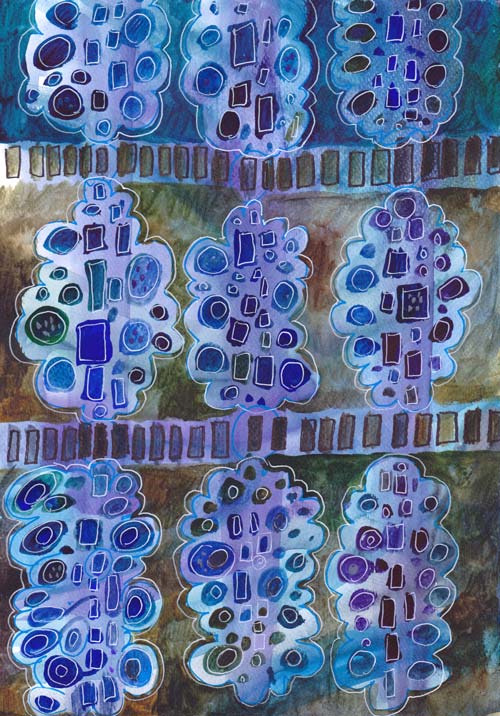
My newest design for hand decorated papers is called Arboretum. Arboretum as a word means a collection of trees. It is often used for the gardens where various kinds of trees from the collection. As you can see below, this design is very versatile: you can create any trees and play with the colors and pattern repeats.

I have used mainly watercolors here, but you can create this pattern with almost any supplies. When I designed this, I was inspired by two things: 1960s retro style and modern quilting.
Living in a house built in the 60s, we have brown, sturdy floor tiles and pine trees in the garden. The whole era celebrated the simple shapes forming simple designs. In modern quilting, solid fabrics are combined with modern patterns. Modern style quilts also often use asymmetrical and improvisational piecing.
I wanted to create a design that would be improvisational as well. I aimed for the painted design that leaves space for variations and self-expression. The simplified black and white pattern picture shows the structure more clearly.
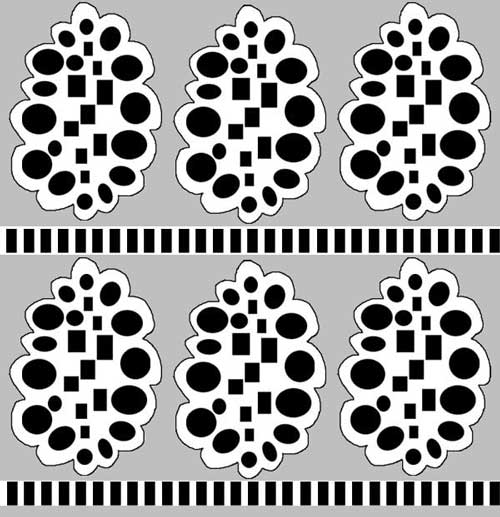
Each of the trees has rectangular shapes in the middle. They represent the trunk of the tree. The rectangles are surrounded by round shapes, which represent leaves. Each row is separated by the row of rectangles, representing the fence or earth. A single tree can also be used alone, as an element in an illustration or as the only image illustrating a text.
Step by Step Instructions for the Painted Design
1) Create the background

Use several colors to create the background. The colors can be intensive but not very dark as this is only the bottom layer that shows behind the trees.
I used thin watercolor paper, watercolors, broad brush and plenty of water. I worked with long strokes from top to bottom and vice versa. The paper was dry, but the brush was very wet. In the end, I added splashes of water to create even more variation.
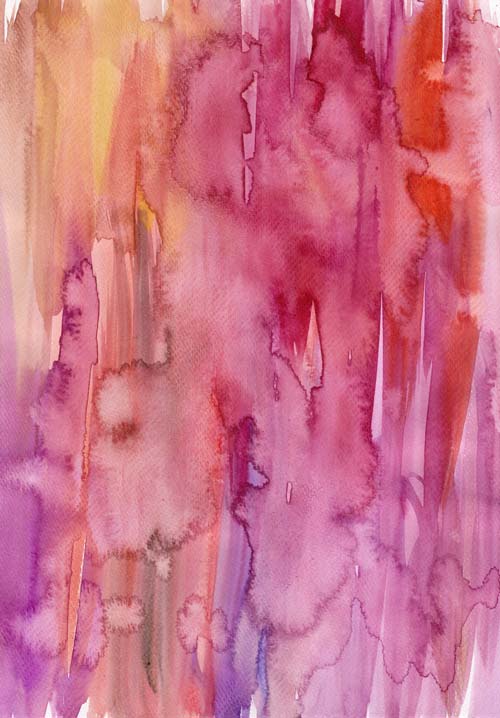
Let the background dry well. If you like the result, and you have a scanner, scan it so that you can use it multiple times by printing it!
2) Add the fences.
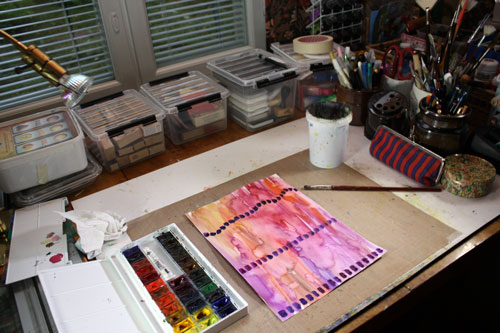
The fences can be straight or curvy. They can break or continue from edge to edge. The distance of these rows determines the size of your trees.
3) Add the trees.

Start with the rectangles of the trunk. Continue by adding circles near them. Create the rectangles and circles in different sizes and different colors. Color variation looks great especially if you maintain the intensity of the color fairly even between the shapes.

Leave some space between the trees.
3) Darken the background around the trees.
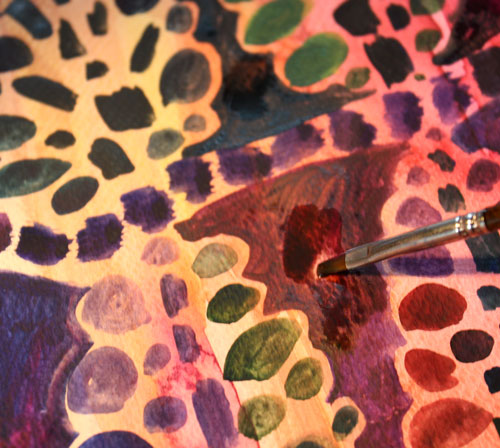
Add darker color to the space between the trees. You can use various colors here too. The dark background represents the sky.
4) Finish with doodles.

Create details to the rectangles and circles. I like to use white gel pen here. You can make each tree look different if you like.
My finished piece is inspired by fall. Thus some trees only had few leaves. On the top row, there ‘s also a tree that has rectangles set like branches. The darkest tree in the upper left corner reminds me of a cone. I could have made an art journal page too by replacing the fence with the journaling. There’s so many little tweaks you can make to this pattern to tell your personal story!

After creating these, I have begun to wonder: what if I cut some of the trees out and created a collage from them!

More patterned papers: Basic instructions + links to more
More inspiration from simple shapes: What to Create from Simple Shapes? 6 ideas
Let me be your art teacher: Subscribe to my weekly emails!
7 thoughts on “Arboretum Patterned Paper”
Comments are closed.
Just when I think I am catching on, you come up with a new fabulous idea. Keeps me on my toes and my head swirling, as I want to be able to create like you but still like me if that makes any sense. I love the trees and can’t wait to try them. Thanks for you ideas and sharing them with all.
Nancy, thanks! It makes a lot of sense! I always try to present more like concepts than anything you need to copy exactly. Have fun with the trees!
These are lovely Paivi. Your generosity in sharing is wonderful. I love how you can articulate your thoughts so clearly, and the simplicity/complexity of your style. And how you inpsire me and teach me new techniques…looking forward to my retirement from teaching next year, so I can try all your wonderful ideas! Should I ever get to Scandinavia, I want a workshop with you.!
Thank you, Liz! I sometimes think that I got my last idea and there’s nothing left! Then I dive into the history of art and design, and soon my mind is filled again. I love teaching workshops, so welcome!
Ihana kuosi… ja tekniikka. Kiitos jälleen kerran.
Kiitos, Anu-Riikka! Thank you!
Another great post, thank you for you generousity! Keeping me inspired and creating.